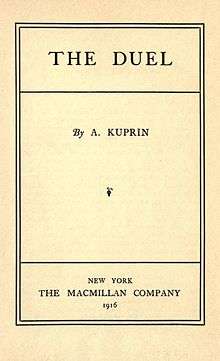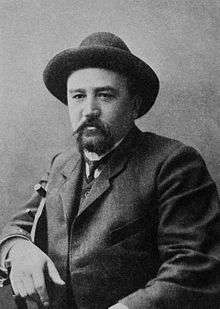The Duel (Kuprin novel)
The Duel (Russian: Поединок; Poedinok) is a novel by Russian author Aleksandr Kuprin published in 1905.[1] It is generally considered his best work;[2] even though Kuprin's 1896 short story Moloch first made his name known as a writer[3] it was The Duel (1905) which made him famous.[4] Because of it "Kuprin was highly praised by fellow writers including Anton Chekhov, Maxim Gorky, Leonid Andreyev, Nobel Prize-winning Ivan Bunin"[5] and Leo Tolstoy who acclaimed him a true successor to Chekhov.

Synopsis
It concerns an intelligent young officer, Second Lieutenant Romashov, stationed at a dull military garrison in southern Russia where he can not stomach his sadistic and stupid colleagues and military life.[2] He falls in love with the wife of a superior officer, a cold and calculating woman whose one ambition is her husband's advancement. The affair leads in the end to the duel of the title, both externally, and figuratively through the young man's naive dreams of grandeur confronting the degeneration of military life and society of the time.
Critical reception
The novel was published soon after the end of the Russo-Japanese War — which Russia lost – and many saw it as a political criticism of the Russian military system.[1] Kuprin considered himself a realist and uninterested in politics, but the timing of the work and Kuprin's own experience in the military – he served seven years as an Army Lieutenant starting in 1890 – led many to give it special political relevance.[2] Translator Josh Billings (2011) said the novel was partly a "revenge on the rosily-romantic picture of garrison life made popular by the warmongering of the early 1900s."[6]
Adaptations
A Soviet adaptation to film was made in 1982, called Shurochka with screenplay and direction by Iosif Kheifits, starring Yelena Finogeyeva, Andrei Nikolayev and Lyudmila Gurchenko.[7] A Russian television adaptation was shown on Russian TV 1 June 9 and 10, 2014.[8]
Editions
- In Honour's Name (tr. W. F. Harvey), London: Everett & Coy, 1907.
- The Duel (tr. unstated), 1916. Modified version of the 1907 W. F. Harvey translation.
- The Duel and Selected Stories (tr. Andrew R. MacAndrew), Signet, 1961.
- The Duel (tr. Josh Billings), New York: Melville House Publishing, 2011. ISBN 9781935554523
References
- Book Review Digest. Volume 12. H.W. Wilson Company. 1917.Pg. 322
- Martin Seymour-Smith (1985). The New Guide to Modern World Literature (Third ed.). Macmillan Press. p. 1051.
- THE MOSCOW WINDOWS'HOME. Sergei Sossinsky. Moscow News (Russia). HISTORY; No. 6. February 17, 1999.
- Nicholas J. L. Luker (1982). An Anthology of Russian Neo-realism: The "Znanie" School of Maxim Gorky, ISBN 0-88233-421-2 - Page 137
- The Literature Network-Kuprin
- Josh Billings (August 24, 2012). "The Art of Translation: Kuprin's The Duel (pt.4)". Melville House Publishing. Retrieved August 25, 2012.
- Shurochka (1982) on IMDb
- Kuprin. Poedinok (2014) on IMDb
External links
- The Duel at Internet Archive
- The Art of Translation: Kuprin's The Duel. Part 2, 3, 4, 5. Josh Billings, August 2012.
- The Duel by Alexander Kuprin, review by August 1, 2009.
